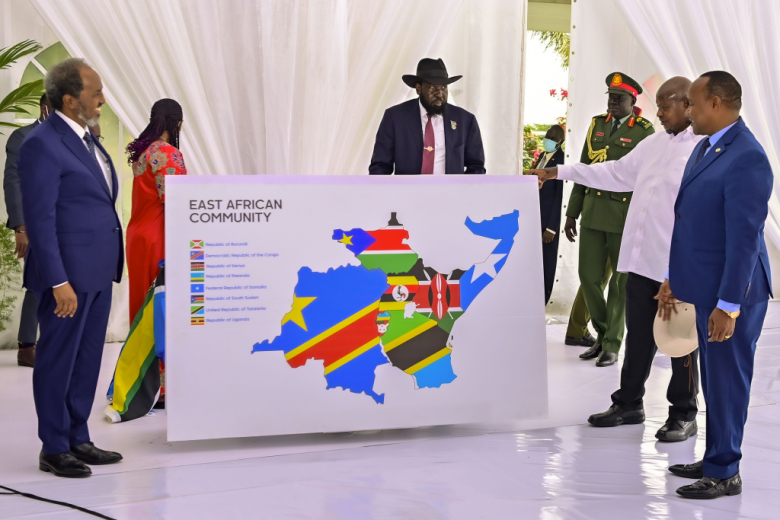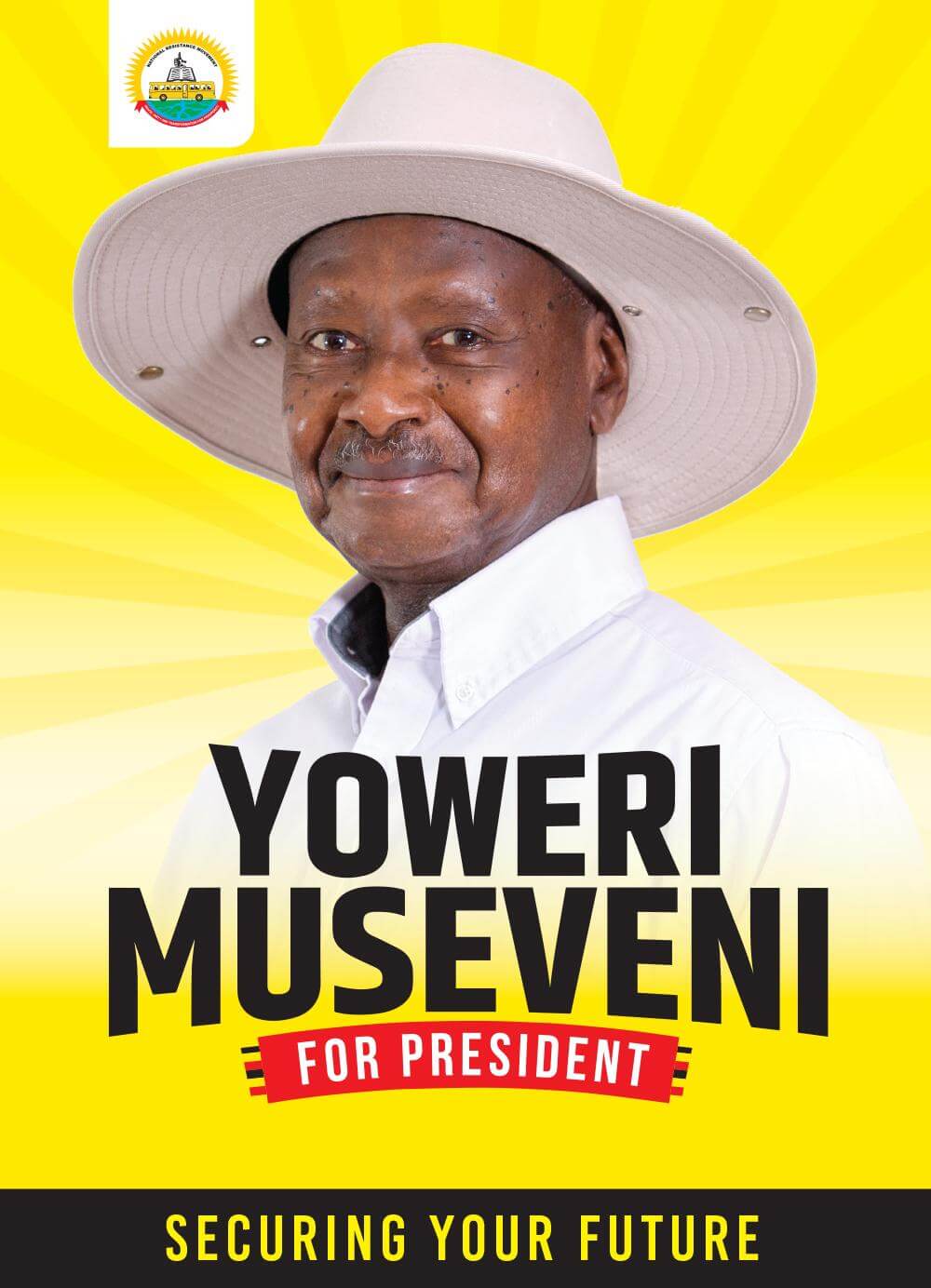
BY PPU REPORTER
President Yoweri Kaguta Museveni has welcomed Somalia into the East African Community, describing the move as a boost to the efforts of the regional bloc to ensure the prosperity and strategic security of its people.
Speaking as a witness at the signing ceremony of the treaty of accession by the Federal Republic of Somalia at State House Entebbe, H.E. Museveni re-echoed the logic behind East African integration, saying strategic security is top on the agenda.
“How can we be secure from what’s happening in the world? Can Uganda alone be secure in the world? Even if Uganda becomes a developed country, can it really be secure against countries like America and China? Suppose China decides to become an imperialist power. They’re developing now, and they don’t have a lot of resources inside China. Suppose they’re saying, We are too many here; some of us should go to Africa; how can we defend ourselves?” H.E Museveni noted.
Accession is the act whereby a state accepts the offer or the opportunity to become a party to a treaty already negotiated and signed by other states.
The ceremony was attended by H.E. Hassan Sheikh Mohamud, President of the Federal Republic of Somalia, and H.E. Gen. Salva Kiir Mayardit, President of the Republic of South Sudan, who is also Chair of the EAC Summit of Heads of State.
Somalia was last month admitted to the East African Community, making it the eighth member of the bloc. The country's admission into the community was approved by the region’s leaders during the 23rd ordinary summit of the heads of state held on November 24, 2023, in Arusha, Tanzania.
President Museveni further revealed that since 1968, Somalia has wanted to be part of the East African Community through its Prime Minister, Mohamed Haji Ibrahim Egal. Still, the process hit a deadlock due to the instabilities in the region at that time.
“In 1968, they had a very clever Prime Minister called Mohamed Egal who came to Arusha, and he wanted to join the East African community, but here we still had the problem of Idi Amin, which we later solved, and that’s how we were able to be part of the solution. I welcome you to Uganda, your home, and I congratulate Somalia,” Gen. Museveni said, adding that Somalia has since been part of the community, describing its accession as a baptism ceremony.
“Somalia is already part of the community. I’m sure if you go to Mogadishu now, you will find goods in the shops from Kenya and even from Uganda. So, what is happening now is just a baptism of what has already happened on the ground,” H.E. Museveni added.
According to President Museveni, through integration, the people of East Africa will be able to have sustainable prosperity that comes from producing and selling a good or a service.
“If you say you want prosperity for your people, then the question is: how will you achieve it? Will you achieve it by getting aid from Europe or what? The answer is no; the only way that you can achieve sustainable prosperity is when you produce a good or a service and sell it. You sell it today and tomorrow so that you build up the prosperity of the home, the company, and the country. But then, if you say prosperity comes from selling goods and services, who buys? That now leads you to the next question: the more buyers that you have, the better. This is the logic of prosperity,” H.E. Museveni said.
“The United States is now one of the richest countries in the world, but neighboring, there's Latin America. In terms of natural resources, Latin America has more natural resources than the United States, and yet they are the most miserable people in the whole world. You see them walking on foot, going to the United States to look for food. They run from a resource-rich region to a much less rich part of the world because the latter is much better organized; the United States created space for people who want to do business. If I'm a businessman in New York, what I produce can be sold up to California, so how will I not be rich?” he added.
On his part, the President of the Federal Republic of Somalia, H.E. Hassan Sheikh Mohamud, expressed gratitude to the member countries of the EAC for admitting his country to the bloc. He said the community symbolizes the realization of their collective aspirations, and it’s a beacon of hope for a future filled with possibilities.
“Somalia is grateful for the acceptance shown by the brotherly states that were in the community. We are also hoping that many more countries will join the community. A special acknowledgment to all member states and the staff of the EAC secretariat for their solidarity and encouragement throughout the whole process of accession. Somalia's geo-strategic significance will elevate the community's global reference and strategic importance,” H.E. Sheikh Mohamud said.
H.E. Gen. Salva Kiir Mayardit welcomed Somalia into the community, an act he said signifies the commitment of both the Somalia and East Africa community to come together in the spirit of African unity for the mutual benefit of its people.
“On behalf of the people of East Africa, I would like to welcome Somalia into the East African Community. As Somalia now joins the East African Community, we have gotten a major boost in integration. We shall continue to work for peace, security, and stability in the entire East Africa,” H.E Salvar Kir said, calling upon the East African Monetary Union protocol to expedite the process of the block having a single currency to boost regional trade.
The EAC Secretary General, Dr. Peter Mathuki saluted member states for their unwavering commitment and continuous provision of guidance to sustain and expand the community.
“Your Excellencies, I again congratulate H.E Hassan Sheikh Mohamud and the people of the Federal Republic of Somalia on this momentous occasion of signing an accession treaty but also for the decision they made to join the EAC family,” Dr. Mathuki said.
He also requested the Heads of State to deepen regional integration to enhance the functionality of the community.
“How can we have freedom of movement of people, goods and services, and money within the community so that people can move, do business and we expand our community?” he inquired.
Dr. Mathuki reiterated the need for a common East African currency, describing it as an opportunity to facilitate trade in the region.
“With our common currency, we are going to reduce the cost of production by 0.5 percent of our GDP and that is the only way we can do business,” he asserted.


